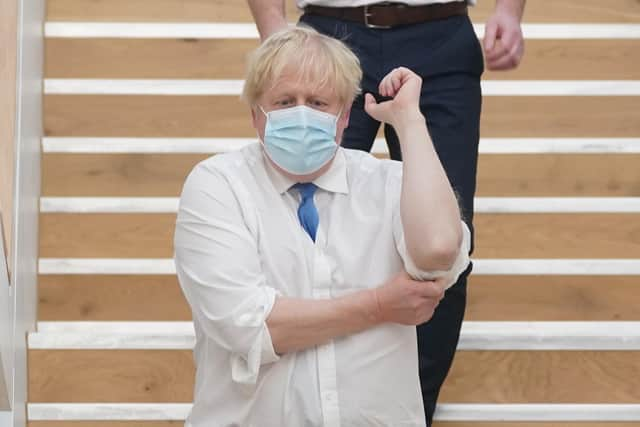Russia-Ukraine conflict: Boris Johnson raises hopes of 'diplomatic opening' to end Ukraine crisis
The Prime Minister made the comment after chairing a meeting of the Cobra emergency committee on Tuesday morning, but said things were still “not encouraging”.
It comes as Russian field hospitals were built close to the Belarus border with Ukraine despite Mr Putin and his foreign policy chief Sergei Lavrov agreeing to continue negotiations.
Advertisement
Hide AdAdvertisement
Hide AdMr Johnson said: “Last night going into today, clearly there are signs of a diplomatic opening.


"Intelligence that we are seeing today is still not encouraging. You have got more battalion tactical groups being brought closer to the border.
“So, mixed signals, I think, at the moment.”
The Prime Minister said Russia had “a lot of options” for entering the country.
He said: “We think they have a huge preparation ready to go virtually at any moment, 130,000 troops or more, a huge number of battalions – more than 90 battalions, tactical groups – and they are stationed around the Ukrainian border.
“Everyone can see what the potential routes in are – down to the south from Belarus, encircling the Ukrainian army in the east around the area, the enclave in Donbas or even coming up from the south from the sea, taking Odesa, Curzon.
“That’s the kind of thing they [could do].”
Mr Johnson called for Russian activity to be “scaled back”.
He said: “I think what everybody needs to see is a programme of de-escalation.
“That means withdrawing the battalion practical groups away from a potential theatre of conflict, not constructing field hospitals on the border with Belarus and between Belarus and Ukraine.
“A sense that things are being scaled back, scaled down, that the threat is over and that a conversation and negotiation is beginning.
Advertisement
Hide AdAdvertisement
Hide Ad“We think there is an avenue for diplomacy. We’ve seen some positive signs from conversations between Mr Ushakov [Mr Putin’s foreign policy adviser] and his American counterpart, between Sergei Lavrov and others.
“If that’s correct, then let’s build on that.”
Speaking to journalists, Mr Johnson also dismissed criticism from some of his Conservative colleagues the UK Government had not done enough to stop the flow of dirty money into the UK.
He said: “I don’t think that it’s fair to say the UK hasn’t done a huge amount on dirty money, whether it’s from Russia or anywhere else.
“What we want to do is strengthen now the package that we have, strengthen the measures we have against potential ill-gotten Russian money, whether here or anywhere for … which we have responsibility with new measures that will hit the companies and concerns that I’ve talked about.
“But also open up the Matryoshka doll, if you like – you know what I’m talking about – so that we see … who really owns the companies that we’re talking about, who really owns the properties that we’re talking about, and those measures, yes, we will be bringing forward from the Economic Crime Bill.”
Mr Johnson's confidence was shared by Nato secretary-general Jens Stoltenberg, who claimed there was cause for “cautious optimism”.
Speaking at a press conference in Brussels, Mr Stoltenberg said there had so far been no signs of military de-escalation from Russia.
However, he said there appeared to be a “willingness” from Moscow to “continue to engage in diplomatic efforts”.
Advertisement
Hide AdAdvertisement
Hide AdBut he also questioned Russia’s claims to have withdrawn troops, telling a press conference in Brussels: “So far we have not seen any de-escalation on the ground – not seen any signs of reduced Russian military presence on the borders of Ukraine.”
Mr Lavrov said military drills were held “on [Russia’s] own territory and according to its own plans – they start, go on and end as planned”.
The exercises are held to a schedule regardless of “who thinks what and who gets hysterical about it, who is deploying real informational terrorism”, he said.
UK foreign secretary Liz Truss warned a “false flag” operation could be launched within days to give Moscow the pretext to launch an offensive.
But Mr Johnson said the UK’s embassy in Kyiv would remain open, despite the risk of an invasion and the decisions made by allies to close their diplomatic missions in the capital.
The Prime Minister discussed the crisis with European Commission president Ursula von der Leyen on Tuesday afternoon, and the pair agreed “more could be done to strengthen” sanctions against Russia.
In a statement, a Downing Street spokeswoman said: “The pair discussed the grave situation on the Ukrainian border, and agreed that the world needed to remain vigilant in the coming hours and days.
“The Prime Minister thanked President von der Leyen for her close co-operation on sanctions to date, and said that the UK and the EU should continue to work with allies to prepare a package of economic measures that would punish Russia if they breached Ukraine’s sovereignty.
Advertisement
Hide AdAdvertisement
Hide Ad“He welcomed the unity of allies, but said more could be done to strengthen co-ordinated measures at pace.”
Mr Johnson also raised the “growing issues” around the Northern Ireland Protocol, the No. 10 official said.
Mr Putin said on Tuesday that he did not want war, but insisted Ukraine’s bid to join Nato posed a major security threat to Russia.
He said: “We need to solve this issue today by peaceful means through a diplomatic process.
“We want our partners to hear our concerns and taken seriously.”
Russia’s defence ministry said some troops and equipment were returning to base following military drills.
Ukraine expressed doubts about Russia’s statements on the pullback.
The country’s foreign minister Dmytro Kuleba said: “We won’t believe when we hear, we’ll believe when we see. When we see troops pulling out, we’ll believe in de-escalation.”
Comments
Want to join the conversation? Please or to comment on this article.

